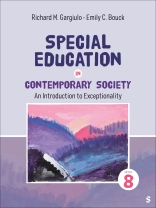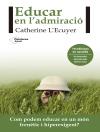Special Education in Contemporary Society: An Introduction to Exceptionality offers a comprehensive, engaging, and readable introduction to the dynamic field of special education. Grounded in the latest research, it reflects current educational standards and equips students with the knowledge, skills, attitudes, and beliefs needed to create inclusive learning environments that empower all students to reach their full potential. Authors Richard M. Gargiulo and Emily C. Bouck encourage a deep awareness and understanding of the 'human’ side of special education, offering insightful perspectives into the lives of exceptional students, their families, and the dedicated teachers who support them. The
Eighth Edition of this text has been updated with new information on specific disabilities and challenges, issues of diversity and equity within special education, and the latest statistics and research that are a hallmark of this book.
Spis treści
Part 1 Foundations of Special Education
1 Special Education in Context
Definitions and Terminology
Categories and Labels
Prevalence of Children and Young Adults With Disabilities
A Brief History of the Development of Special Education
Professionals Who Work With Individuals With Exceptionalities
Cooperative Teaching
Universal Design for Learning
Exceptionality Across the Life Span
Chapter in Review
Study Questions
Key Terms
Learning Activities
Reflecting on Standards
2 Policies, Practices, and Programs
Litigation and Legislation Affecting Special Education
Educational Reform: Standards-Based Education
Civil Rights Legislation
Identification and Assessment of Individual Differences
Referral and Assessment for Special Education
Designing Individualized Instructional Programs
Service Delivery Options: Where a Special Education Is Provided
Chapter in Review
Study Questions
Key Terms
Learning Activities
Reflecting on Standards
3 Cultural and Linguistic Diversity and Exceptionality
Cultural Diversity: The Changing Face of a Nation
Multicultural Education, Bilingual Education, and Student Diversity
Disproportionate Representation of Minority Students in Special Education Programs
Issues in Assessing Students From Culturally and Linguistically Diverse Groups
Educational Programming for Students With Exceptionalities Who Are Culturally and Linguistically Diverse
Chapter in Review
Study Questions
Key Terms
Learning Activities
Reflecting on Standards
4 Parents, Families, and Exceptionality
Parent–Professional Relationships: Changing Roles
A Family Systems Approach
The Effects of a Child’s Disability on Parents and the Family
Working With Families Who Are Culturally and Linguistically Diverse
Suggestions for Facilitating Family and Professional Partnerships
Chapter in Review
Study Questions
Key Terms
Learning Activities
Reflecting on Standards
5 Assistive Technology
Technology in Education
History and Legislation of Assistive Technology
Assistive Technology Decision-Making
Assistive Technology Categorization
Devices and Tools
Issues With Assistive Technology
Chapter in Review
Study Questions
Key Terms
Learning Activities
Reflecting on Standards
Organizations Concerned With Assistive Technology
Part 2 A Study of Individuals With Exceptionalities
6 Individuals With Intellectual Disability
Prevalence of Intellectual Disability
A Brief History of the Field
Identifying Intellectual Ability and Adaptive Behavior
Etiology of Intellectual Disability
Educational Considerations
Inclusive Education Experience
Strategies for Inclusive Classrooms
Working With Parents and Families
Advice for Making Inclusion and Collaboration Work
Technology and Individuals With Intellectual Disability
Intellectual Disability Across a Life Span
Trends, Issues, and Controversies
Chapter in Review
Study Questions
Key Terms
Learning Activities
Reflecting on Standards
Organizations Concerned With Intellectual Disability
7 Individuals With Learning Disabilities
Prevalence of Learning Disabilities
A Brief History of the Field
Defining Learning Disabilities
Etiology of Learning Disabilities
Characteristics of Individuals With Learning Disabilities
Assessment of Learning Disabilities
Educational Considerations
Technology and Individuals With Learning Disabilities
Learning Disabilities Across a Life Span
Trends, Issues, and Controversies
Chapter in Review
Study Questions
Key Terms
Learning Activities
Organizations Concerned With Learning Disabilities
Reflecting on Standards
8 Individuals With Attention-Deficit/Hyperactivity Disorder
Prevalence of Attention-Deficit/Hyperactivity Disorder
A Brief History of the Field
Identifying Attention-Deficit/Hyperactivity Disorder
Etiology of Attention-Deficit/Hyperactivity Disorder
Educational Considerations
Technology and Individuals With Attention-Deficit/Hyperactivity Disorder
Adolescents and Adults With Attention-Deficit/Hyperactivity Disorder
Issues of Diversity
Chapter in Review
Study Questions
Key Terms
Learning Activities
Organizations Concerned With Attention-Deficit/Hyperactivity Disorder
Reflecting on Standards
9 Individuals With Emotional and Behavioral Disorders
Prevalence of Emotional and Behavioral Disorders
A Brief History of the Field
Identifying Individuals With Emotional and Behavioral Disorder
Etiology of Emotional and Behavioral Disorders
Prevention of Emotional and Behavioral Disorders
Educational Considerations
Technology and Individuals With Emotional and Behavioral Disorders
Emotional and Behavior Disorders Across a Life Span
Trends, Issues, and Controversies
Chapter in Review
Study Questions
Key Terms
Learning Activities
Organizations Concerned With Emotional and Behavioral Disorders
Reflecting on Standards
10 Individuals With Autism Spectrum Disorder
Prevalence of Autism Spectrum Disorder
A Brief History of the Field
Identifying Individuals With Autism Spectrum Disorder
Etiology of Autism Spectrum Disorder
Educational Considerations
Technology and Individuals With Autism Spectrum Disorder
Autism Spectrum Disorder Across a Life Span
Trends, Issues, and Controversies
Chapter in Review
Study Questions
Key Terms
Learning Activities
Organizations Concerned With Autism Spectrum Disorder
Reflecting on Standards
11 Individuals With Speech and Language Impairments
Prevalence and History of Speech and Language Impairments
The Nature of Speech, Language, and Communication
Identifying Speech and Language Impairments
Etiology and Prevention of Speech and Language Impairments
Assessing Individuals With Speech and Language Impairments
Educational Considerations
Technology and Individuals With Speech and Language Impairments
Speech and Language Impairments Across a Life Span
Issues of Diversity
Chapter in Review
Study Questions
Key Terms
Learning Activities
Organizations Concerned With Speech and Language Impairments
Reflecting on Standards
12 Individuals With Hearing Impairments
Prevalence of Hearing Impairment
A Brief History of the Field
Identifying Individuals With Hearing Impairment
Etiology of Hearing Impairment
Educational Challenges and Their Assessment
Educational Considerations
Technology and Individuals With Hearing Impairments
Hearing Impairment Across a Life Span
Trends, Issues, and Controversies
Chapter in Review
Study Questions
Key Terms
Learning Activities
Organizations Concerned With Hearing Impairments
Reflecting on Standards
13 Individuals With Visual Impairments
Prevalence of Visual Impairments
A Brief History of Visual Impairments
Identifying Students With Visual Impairment
The Vision Process and Etiology of Visual Impairments
Prevention of Visual Impairments
Educational Considerations
Technology and Individuals With Visual Impairments
Visual Impairments Across a Life Span
Trends, Issues, and Controversies
Chapter in Review
Study Questions
Key Terms
Learning Activities
Organizations Concerned With Visual Impairments
Reflecting on Standards
14 Individuals With Physical Disabilities, Health Disabilities, and Related Low-Incidence Disabilities
Prevalence of Physical Disabilities, Health Disabilities, and Related Low-Incidence Disabilities
A Brief History of the Field
Identifying Physical Disabilities, Health Disabilities, and Related Low-Incidence Disabilities
Etiology of Physical Disabilities, Health Disabilities, and Related Low-Incidence Disabilities
Educational Considerations
Technology and Individuals With Physical Disabilities, Health Disabilities, and Related Low-Incidence Disabilities
Physical Disabilities, Health Disabilities, and Related Low-Incidence Disabilities Across a Life Span
Trends, Issues, and Controversies
Chapter in Review
Study Questions
Key Terms
Learning Activities
Organizations Concerned With Physical Disabilities, Health Disabilities, or Related Low-Incidence Disabilities
Reflecting on Standards
15 Individuals Who Are Gifted and Talented
Prevalence of Giftedness and Talent
A Brief History of the Field of Gifted and Talented Education
Identifying Individuals Who Are Gifted
Etiology of Giftedness and Talent
Educational Considerations
Technology and Individuals Who Are Gifted and Talented 512 Giftedness Across a Life Span
Trends, Issues, and Controversies
Chapter in Review
Study Questions
Key Terms
Learning Activities
Organizations Concerned With Giftedness
Reflecting on Standards
Appendix A. Federal Definitions of Disabilities
Appendix B. Professional Standards: Council for Exceptional Children
Glossary
O autorze
Emily Bouck is an Associate Professor of Special Education in the Department of Counseling, Educational Psychology, and Special Education at Michigan State University. She received her doctorate in special education from Michigan State University. Dr. Bouck is the author of numerous peer-reviewed journal articles and chapters relating to her two main areas of research: mathematics education for students with disabilities and functional life-skills education for students with disabilities with a central theme of assistive technology throughout both areas. Dr. Bouck is a Past President of the Division on Autism and Developmental Disabilities of the Council for Exceptional Children and has also been active in the Technology and Media Division of the Council for Exceptional Children. Dr. Bouck taught courses on assistive technology; social, legal, and ethical issues in special education; special education methods; and doctoral seminars. She has experience working with a range of students with disabilities in school-settings from preschool through age 26.












